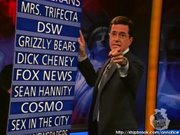Friday, June 01, 2007
“Democracy must be something more than two wolves and a sheep voting on what to have for dinner” --James Bovard--
A democracy is nothing more than mob rule, where fifty-one percent of the people may take away the rights of the other forty-nine. --Thomas Jefferson--Bryan Caplan an adjunct scholar at the Libertarian think tank the CATO Institute argues as such. It's an interesting proposition. Most Americans can't name half of the Supreme Court Justices, or tell you the difference between Shia and Sunni, or basic economic theory, yet their opinion on what should be done about these issues matters when determining who represents them in congress.
In theory, democracy is a bulwark against socially harmful policies. In practice, however, democracies frequently adopt and maintain policies that are damaging. How can this paradox be explained?
The influence of special interests and voter ignorance are two leading explanations. I offer an alternative story of how and why democracy fails. The central idea is that voters are worse than ignorant; they are, in a word, irrational—and they vote accordingly. Despite their lack of knowledge, voters are not humble agnostics; instead, they confidently embrace a long list of misconceptions.
Economic policy is the primary activity of the modern state. And if there is one thing that the public deeply misunderstands, it is economics. People do not grasp the "invisible hand" of the market, with its ability to harmonize private greed and the public interest. I call this anti-market bias. They underestimate the benefits of interaction with foreigners. I call this anti-foreign bias. They equate prosperity not with production, but with employment. I call this make-work bias. Finally, they are overly prone to think that economic conditions are bad and getting worse. I call this pessimistic bias.
Bryan Caplan has a libertarian bias. But, we are all critics. Caplan would argue that free market capitalism is rational, yet rationality and the way a stock might move on a rumor, a sudden panic, or somebody sneezing in the direction belies that theory.
There also is the values question. If you had a group of ten people and under one economic philosophy, let's use free market capitalism as an example, they ended up with one person having $500,000 and the other 9 having $20,000 each, there would be a total of $680,000 in the system. Perhaps you wanted to tax the big gainer, Strip $270,000 away from him. This hurt the economy of this community, and he was only left with $100,000. The remaining 9 dropped to $10,000 on their own, plus $30,000 each from the wealth transfer. They each have twice as much money, but there is less money in the system.
What works better is a value judgment. The Republicans have created much of their gains until the recent setback knowing this intuitively. Convincing a person who makes $30,000 a year as a worker in a position that might be outsourced to lower the taxes on the wealthy, cut social services, reduce funding for health care would be insane rationally.
The democrats would sweep in big if it worked that way. Just tell the bottom 80% that they were getting massive tax cuts all payed for by soaking the rich. But, many values voters care more about abortion and homosexuality then for their own economic interest.
It is one too many layers of sophistication to tell a working class stiff to take one for the team. That is essentially what the libertarians are asking them to do. If you are not an entrepreneur, don't soak the rich, in exchange for a theoretical societal advantage by their capital being used productively.
Fortunately for the Republicans, the democrats are beholden to many of the same interests, and the idea of turning democracy into mob rule has never really taken shape. A platform of eliminating all taxes below $200,000 in income, and taxing it at 50% above that up to $1,000,000 where it goes up to 90% might actually garner interest in those who have a hard time finding money for their health care coverage.
The democrats and the republicans are acting in the way that Thomas Jefferson expected. They are preventing mob rule. There are many arguments that can justify it. The Cato Institute might not want voters to become rational however. They might not like the decisions the people would make in their own individual interests.
Posted by
trifecta
at
7:49 PM
![]()
Labels: Bryan Caplan, cato
Subscribe to:
Comment Feed (RSS)



|